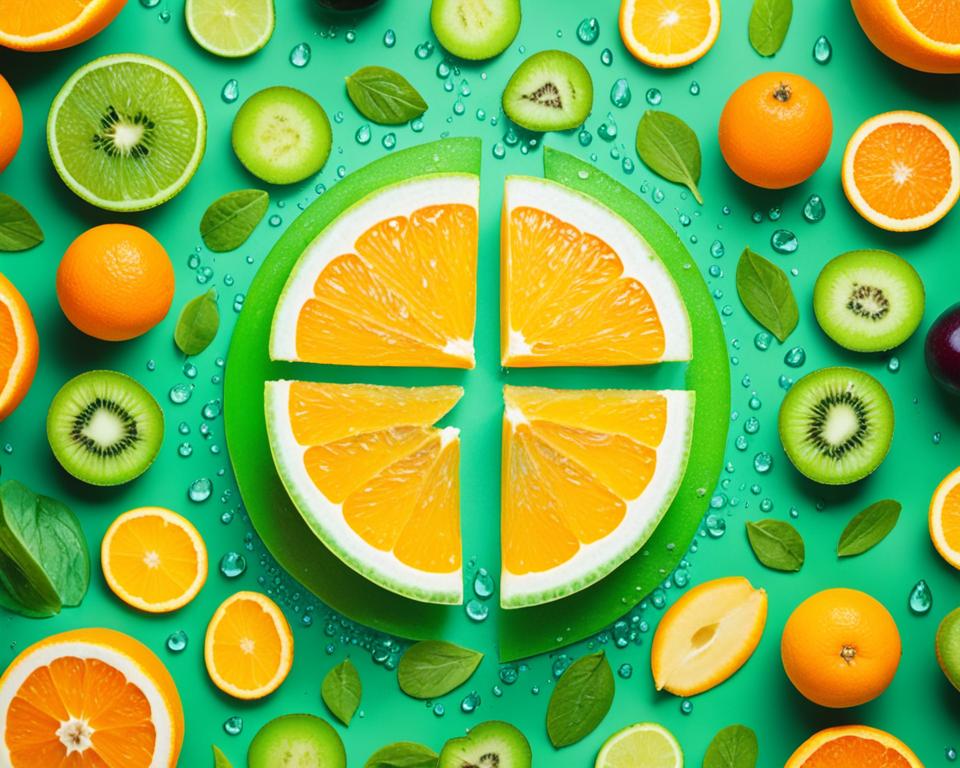When it comes to maintaining optimal health and well-being, incorporating vitamin C into your daily routine is essential. Vitamin C, also known as ascorbic acid, is a water-soluble vitamin that plays a crucial role in numerous bodily functions.
Vitamin C is renowned for its powerful antioxidant properties, which help protect the body against oxidative stress and cellular damage. It is also involved in collagen synthesis, immune function, and the absorption of iron.
But what are the specific uses and health benefits of vitamin C? Let’s explore the various ways this vitamin can positively impact your overall health.
Key Takeaways:
- Vitamin C is essential for maintaining optimal health and well-being.
- It has powerful antioxidant properties, protecting against oxidative stress and cellular damage.
- Vitamin C plays a vital role in collagen synthesis and immune function.
- It also enhances the absorption of iron in the body.
- Incorporating foods high in vitamin C and considering supplements can help ensure an adequate intake.
Immune System Support

Vitamin C plays a crucial role in supporting and boosting the immune system, helping to fight off colds and flu. Its immune-enhancing properties make it an essential nutrient for maintaining overall health and well-being.
When the immune system is compromised, the body becomes more susceptible to infections and illnesses. Vitamin C acts as a powerful antioxidant, protecting immune cells from damage caused by free radicals and helping them function optimally.
Furthermore, vitamin C stimulates the production of white blood cells, which are responsible for fighting off foreign invaders and pathogens in the body. These cells play a vital role in the immune response, helping to prevent and combat infections.
In addition to directly supporting immune function, vitamin C also aids in the synthesis of collagen, a protein that is essential for the health of the skin, connective tissues, and blood vessels. This strengthens the body’s natural defense system, making it more resilient and better equipped to combat illness.
“Vitamin C is a crucial nutrient for immune system support, helping to strengthen the body’s natural defense mechanisms and fight off common colds and flu.”
It is recommended to consume vitamin C-rich foods or supplements regularly to maintain optimal immune function. Some excellent sources of vitamin C include citrus fruits, strawberries, kiwi, bell peppers, and leafy greens.
| Food Source | Vitamin C Content (per 100g) |
|---|---|
| Oranges | 53.2mg |
| Strawberries | 58.8mg |
| Kiwi | 92.7mg |
| Bell Peppers | 183.5mg |
| Kale | 120mg |
By incorporating vitamin C into your diet, you can give your immune system the support it needs to fight off colds and flu, ensuring your body stays healthy and strong.
Skin Health
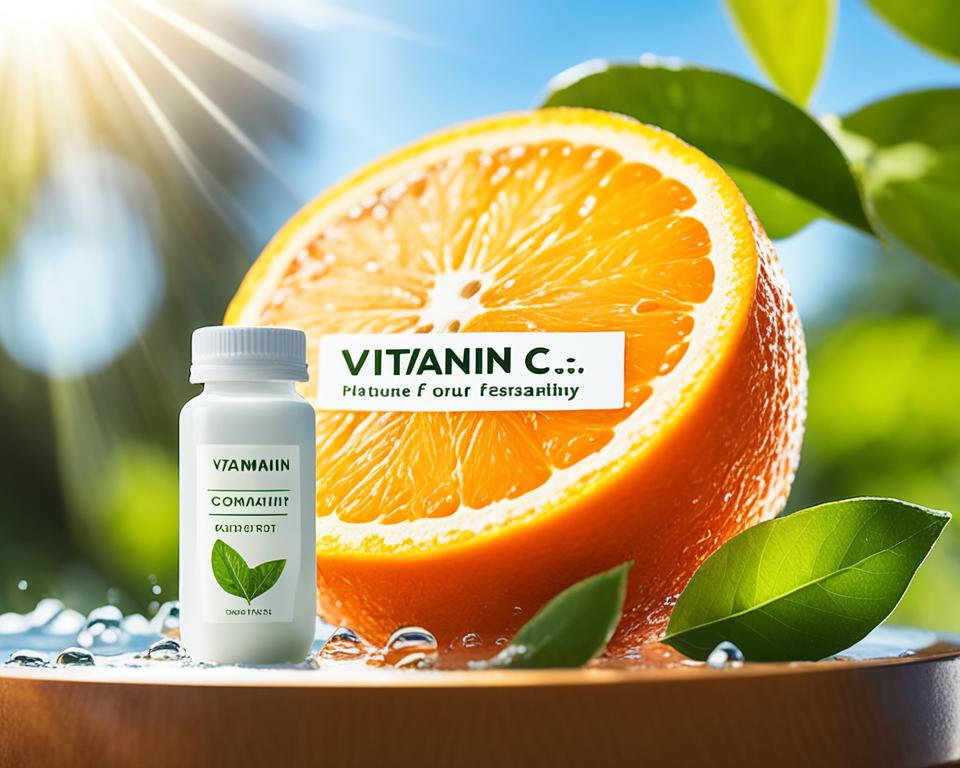
Vitamin C is not just important for overall health, but it also plays a crucial role in maintaining radiant and youthful skin. By incorporating vitamin C into your skincare routine, you can unlock a multitude of benefits for your skin.
Benefits of Vitamin C for Skin
One of the key advantages of vitamin C for skin is its antioxidant properties. Antioxidants help protect the skin from free radicals, which are unstable molecules that can cause oxidative stress and damage to the skin cells. This damage can lead to premature aging, dullness, and the formation of wrinkles and fine lines.
In addition to its antioxidant effects, vitamin C stimulates collagen production in the skin. Collagen is a protein that provides structure and elasticity to the skin, helping to maintain its firmness and smoothness. By promoting collagen synthesis, vitamin C can reduce the appearance of wrinkles and fine lines, improving the overall texture of your skin.
Reducing Signs of Aging
When it comes to reducing signs of aging, vitamin C is a true powerhouse. Its ability to stimulate collagen production not only helps smooth out wrinkles, but it also helps to fade dark spots and hyperpigmentation, leaving you with a more even skin tone.
Furthermore, vitamin C has been shown to inhibit the production of melanin, the pigment responsible for dark spots and uneven skin tone. By suppressing melanin production, vitamin C can help fade existing dark spots and prevent the formation of new ones, giving you a brighter and more youthful complexion.
Antioxidants for Healthy Skin
The antioxidant properties of vitamin C also make it an excellent ingredient for protecting your skin against environmental stressors such as pollution and UV radiation. These external factors can lead to free radical damage and accelerate the aging process. By incorporating vitamin C into your skincare routine, you can combat these damaging effects and promote healthier, more resilient skin.
Top 5 Foods High in Vitamin C
| Food | Vitamin C Content (per 100g) |
|---|---|
| Oranges (raw) | 53.2mg |
| Kiwis | 92.7mg |
| Strawberries | 58.8mg |
| Red bell peppers (raw) | 128.0mg |
| Broccoli (raw) | 89.2mg |
It’s important to note that while consuming vitamin C-rich foods can certainly provide benefits for your skin, topical application of vitamin C products is more direct and effective for targeting specific skin concerns.
“Vitamin C is an essential nutrient for maintaining healthy and youthful skin. Its antioxidant properties, ability to stimulate collagen production, and role in reducing signs of aging make it a must-have ingredient in any skincare regimen.” – Dr. Sarah Johnson, Dermatologist
Wound Healing
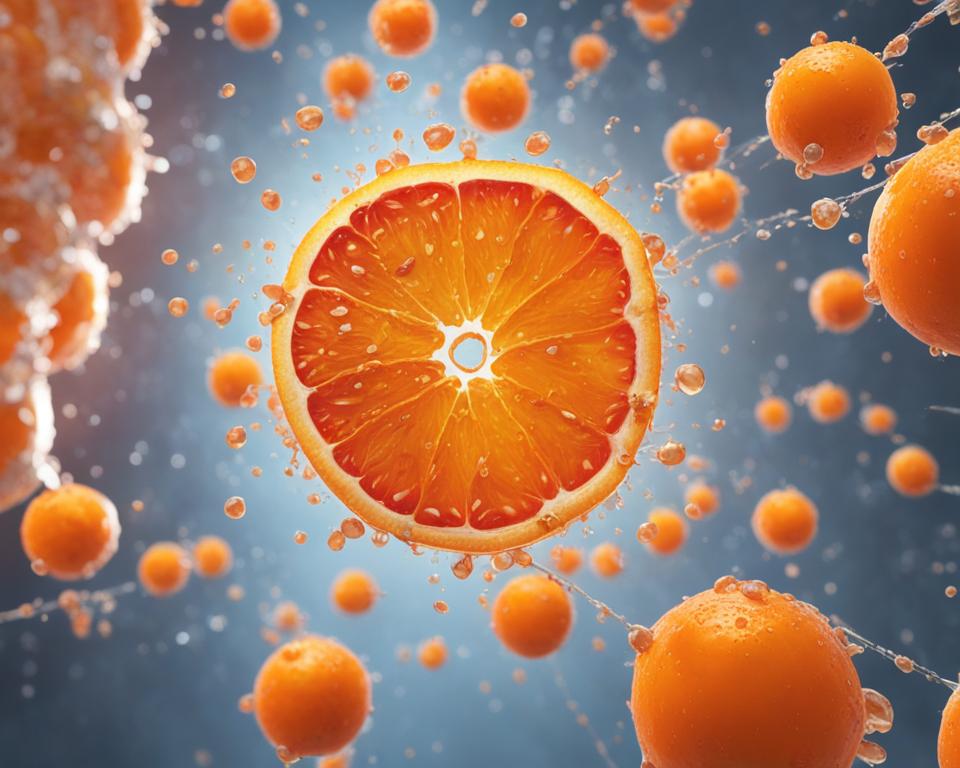
When it comes to wound healing, vitamin C plays a crucial role in the process. Its ability to aid in collagen production and promote tissue repair make it an essential nutrient for the body’s natural healing mechanisms.
Collagen is a protein that acts as the building block for healthy skin, connective tissues, and blood vessels. It provides structure and strength to the wound, helping it to heal effectively. Vitamin C is necessary for the synthesis of collagen, ensuring that the body has an adequate supply of this vital protein.
Furthermore, vitamin C acts as an antioxidant, protecting the cells from damage caused by free radicals. This antioxidant effect aids in reducing inflammation at the wound site, allowing the healing process to proceed unhindered.
To ensure optimal wound healing, it is essential to maintain an adequate intake of vitamin C either through dietary sources or supplements. Incorporating foods rich in vitamin C, such as citrus fruits, berries, broccoli, and peppers, into your diet can help support the body’s healing process.
| Vitamin C-Rich Foods | Vitamin C Content (mg per 100g) |
|---|---|
| Oranges | 53.2 |
| Strawberries | 58.8 |
| Kiwi | 92.7 |
| Red Bell Peppers | 80.4 |
| Kale | 120 |
Additionally, vitamin C supplements can be taken under the guidance of a healthcare professional to ensure adequate levels are reached. However, it’s important to note that excessive intake of vitamin C may cause gastrointestinal discomfort or other side effects. Moderation is key when supplementing vitamin C.
By prioritizing vitamin C in your diet, you can support the body’s wound healing process, enhance collagen production, and promote tissue repair for optimal recovery.
Heart Health

Vitamin C plays a crucial role in supporting heart health. Its antioxidant effects help reduce the risk of heart disease by protecting the cardiovascular system from oxidative stress and inflammation.
Studies have shown that individuals with higher levels of vitamin C in their blood have a lower risk of developing heart disease. Vitamin C promotes the health of blood vessels, improves blood flow, and reduces the formation of plaque in the arteries, which can lead to atherosclerosis.
Additionally, vitamin C enhances the function of endothelial cells, which are responsible for regulating blood pressure and maintaining healthy blood vessel walls. By improving endothelial function, vitamin C helps reduce the risk of high blood pressure and other cardiovascular conditions.
| Benefits of Vitamin C for Heart Health | How Vitamin C Reduces Risk of Heart Disease |
|---|---|
| Enhances antioxidant capacity | Reduces oxidative stress and inflammation in the cardiovascular system |
| Promotes healthy blood vessel function | Improves endothelial function and regulates blood pressure |
| Reduces plaque formation in arteries | Prevents atherosclerosis and improves blood flow |
Vitamin C acts as a potent antioxidant, neutralizing harmful free radicals that can damage the heart and blood vessels. Its ability to reduce oxidative stress and inflammation contributes to a healthier cardiovascular system and a lower risk of heart disease.
It is important to note that while vitamin C is beneficial for heart health, it should not replace other lifestyle factors that contribute to overall cardiovascular wellness. A balanced diet, regular exercise, maintaining a healthy weight, and avoiding smoking are also essential for a healthy heart.
Eye Health
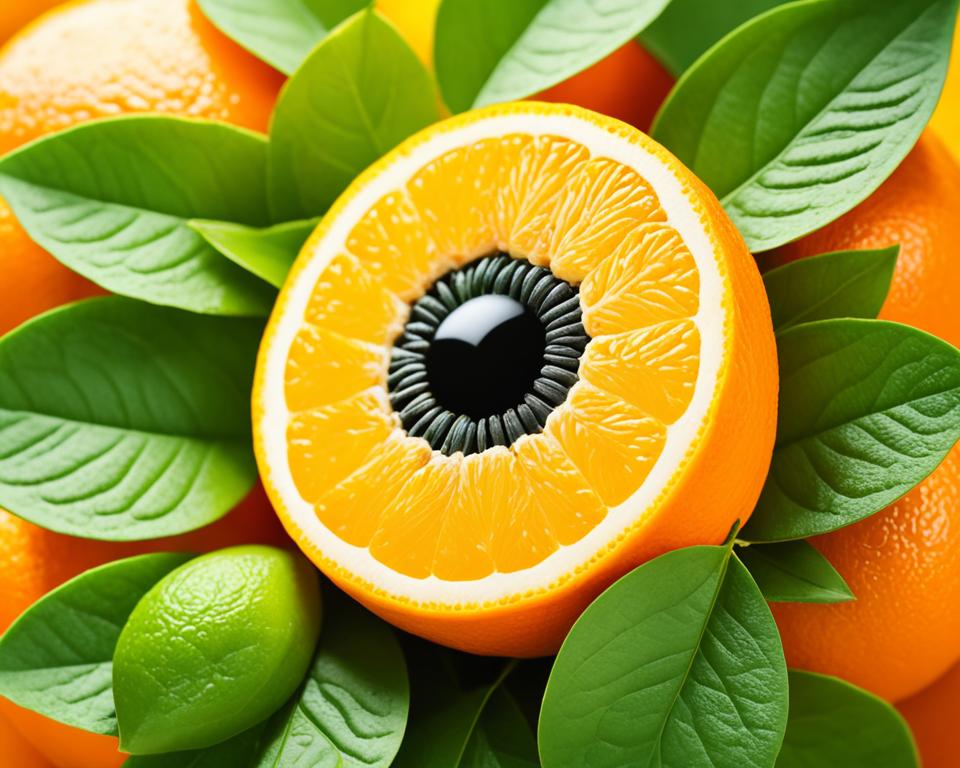
Vitamin C plays a crucial role in maintaining proper eye health and reducing the risk of age-related eye conditions such as cataracts. Its antioxidant properties help protect the eyes from damage caused by free radicals, which can lead to the development of eye diseases.
To understand the significance of vitamin C for eye health, let’s take a closer look at its benefits:
- Reducing the Risk of Cataracts: Cataracts are characterized by the clouding of the lens in the eye, resulting in blurred vision. Research suggests that vitamin C, along with other antioxidants, may help reduce the risk of cataracts by preventing oxidative stress and delaying the progression of the condition.
- Maintaining Eye Health: Vitamin C supports the health of blood vessels in the eyes, promoting proper blood circulation and nourishment to the ocular tissues. This can help prevent various eye disorders and maintain optimal vision.
Vitamin C-Rich Foods for Eye Health
Incorporating vitamin C-rich foods into your diet can offer substantial benefits for your eyes. Here are some excellent natural sources of vitamin C:
| Foods | Vitamin C Content (per 100g) |
|---|---|
| Oranges | 53.2mg |
| Kiwis | 92.7mg |
| Strawberries | 59.0mg |
| Bell Peppers (Red) | 127.7mg |
| Guavas | 228.3mg |
These vitamin C-rich foods can be easily incorporated into your daily diet, providing the essential nutrients required for maintaining optimal eye health. Along with a balanced diet, it’s also recommended to consult with an eye care professional for regular check-ups and follow any prescribed treatment plans to ensure proper eye care.
Remember, a diet rich in vitamin C can significantly contribute to maintaining healthy eyes and reducing the risk of age-related eye conditions like cataracts.
Brain Function
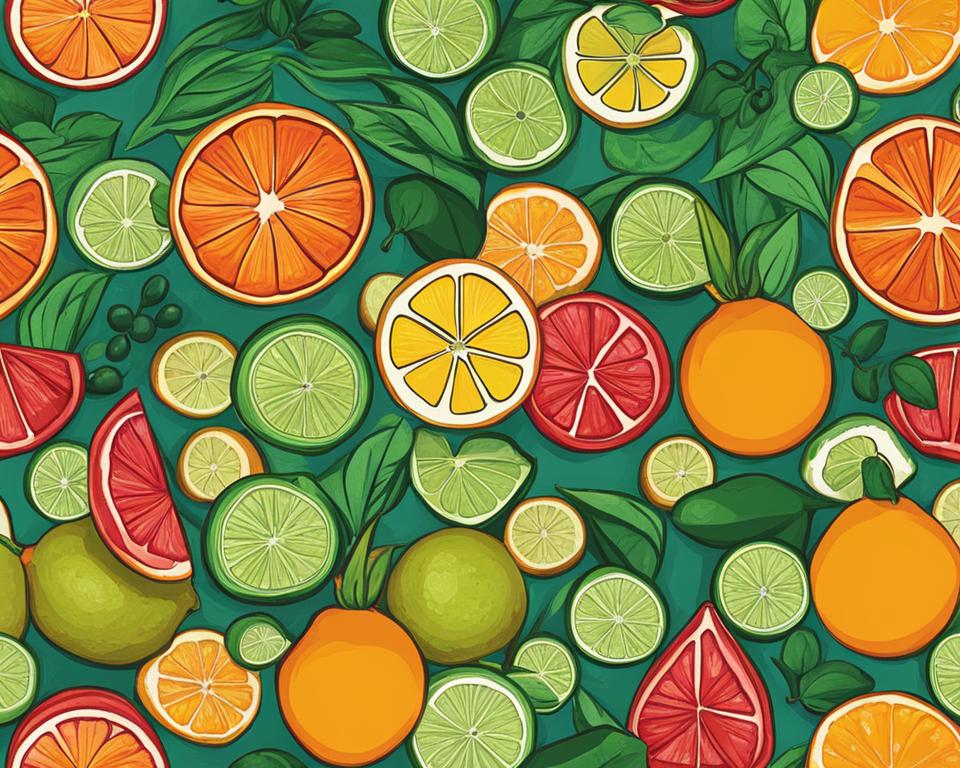
Vitamin C plays a crucial role in supporting brain health and cognitive function. The antioxidant properties of Vitamin C help protect brain cells from oxidative stress and damage caused by harmful molecules called free radicals. This, in turn, promotes healthy brain aging and reduces the risk of cognitive decline.
Vitamin C is involved in the production of neurotransmitters, chemicals that transmit signals between brain cells. It helps in the synthesis of important neurotransmitters like dopamine, norepinephrine, and serotonin, which are essential for mood regulation, memory, and cognitive performance.
Research has shown that adequate levels of Vitamin C are associated with better cognitive function, including improved memory, attention, and problem-solving skills. It has also been suggested that Vitamin C may help reduce the risk of age-related neurodegenerative disorders, such as Alzheimer’s disease and dementia.
Furthermore, Vitamin C enhances the absorption of iron, a mineral essential for brain function. Iron is involved in the production of myelin, a protective covering of nerve cells that facilitates efficient electrical signaling in the brain. By facilitating iron absorption, Vitamin C contributes to optimal brain function.
To reap the benefits of Vitamin C for brain health, incorporate it into your daily diet. Enjoy a variety of fruits and vegetables rich in Vitamin C, such as oranges, strawberries, kiwi, bell peppers, and broccoli. Consider taking a Vitamin C supplement if necessary, but always consult with a healthcare professional for personalized guidance.
Foods High in Vitamin C
| Food | Vitamin C Content (Per 100g) |
|---|---|
| Oranges | 53.2mg |
| Strawberries | 58.8mg |
| Kiwi | 92.7mg |
| Bell Peppers | 80.4mg |
| Broccoli | 89.2mg |
Iron Absorption

Vitamin C plays a crucial role in aiding in the absorption of iron by the body, which is essential for preventing iron-deficiency anemia. Iron is a vital mineral that carries oxygen throughout the body, supporting energy production and overall well-being. However, iron absorption can be a complex process, and several factors can affect its efficiency.
One of the ways vitamin C helps enhance iron absorption is by converting non-heme iron, which is found primarily in plant-based foods, into a more easily absorbable form. The presence of vitamin C in the digestive system helps reduce non-heme iron to its ferrous form, making it more readily available for absorption in the small intestine.
Research has also shown that vitamin C forms a soluble complex with iron, preventing the formation of insoluble compounds that could impair iron absorption. This interaction between vitamin C and iron ensures that the body can effectively utilize the iron consumed through diet and supplements.
In addition to its role in enhancing iron absorption, vitamin C also acts as a powerful antioxidant, protecting iron from oxidative damage. This is particularly important as iron can undergo changes in its oxidation state, leading to the generation of harmful free radicals. By neutralizing these free radicals, vitamin C helps maintain the integrity and functionality of iron in the body.
To optimize iron absorption, it is recommended to consume foods rich in both iron and vitamin C. Including citrus fruits, berries, bell peppers, tomatoes, and leafy green vegetables in your diet can provide a significant amount of vitamin C to enhance iron absorption.
Here is an example of a superior diet that combines iron and vitamin C-rich foods:
| Iron-Rich Foods | Vitamin C-Rich Foods |
|---|---|
| Spinach | Strawberries |
| Lean red meat | Oranges |
| Legumes | Pineapple |
| Tofu | Broccoli |
| Quinoa | Kiwi |
By incorporating both iron and vitamin C-rich foods into your diet, you can ensure optimal iron absorption and reduce the risk of iron-deficiency anemia. Remember, it is always best to consult with a healthcare professional or registered dietitian for personalized advice on meeting your nutritional needs.
Exercise Performance

Vitamin C plays a crucial role in enhancing athletic performance and reducing muscle soreness. Regular intake of vitamin C has been shown to have positive effects on exercise and sports performance.
One of the ways vitamin C enhances athletic performance is by supporting the immune system. Exercise puts stress on the body, increasing the risk of infections and illnesses. However, vitamin C helps boost the immune system, reducing the likelihood of falling ill and allowing athletes to maintain consistent training schedules.
Furthermore, vitamin C is essential for collagen synthesis, a protein that supports the structure and stability of connective tissues, including tendons and ligaments. By maintaining the health of these tissues, vitamin C helps prevent injuries and improves overall athletic performance.
Scientific studies have also shown that vitamin C supplementation can reduce muscle soreness after intense exercise. It has antioxidant properties that help reduce inflammation and oxidative stress, both of which contribute to muscle soreness and fatigue. By reducing muscle soreness, athletes can recover faster and perform at their best in subsequent training sessions or competitions.
Recommended Daily Intake of Vitamin C for Athletes:
| Athlete Type | Vitamin C Recommended Daily Intake |
|---|---|
| Endurance Athletes | 100-200 mg |
| Strength Athletes | 100-200 mg |
| Team Sport Athletes | 100-200 mg |
It is important for athletes to meet their recommended daily intake of vitamin C through a balanced diet that includes vitamin C-rich foods such as citrus fruits, strawberries, kiwi, bell peppers, and broccoli. In some cases, athletes may benefit from vitamin C supplementation, especially if their dietary intake is insufficient.
“Vitamin C is a crucial nutrient for athletes, as it not only supports the immune system but also enhances exercise performance by reducing muscle soreness and promoting faster recovery.” – Dr. Sarah Johnson, Sports Nutritionist
Stress Management

Stress is an unavoidable part of life, but finding effective ways to manage it is crucial for our overall well-being. When it comes to reducing stress levels, vitamin C plays a significant role. This powerful antioxidant not only supports our immune system, but it also supports our body’s ability to cope with stress.
The adrenal glands, located on top of the kidneys, are responsible for producing hormones that help us cope with stress. However, chronic stress can lead to imbalances in adrenal gland function, resulting in fatigue, anxiety, and other negative effects. This is where vitamin C comes in.
Vitamin C is essential for the proper functioning of the adrenal glands. It supports the production of stress hormones, such as cortisol, and helps regulate their release. By maintaining healthy adrenal gland function, vitamin C can help reduce stress levels and promote a sense of calm.
“Vitamin C is vital for maintaining a healthy stress response. It helps regulate the release of stress hormones, allowing us to better cope with the challenges of daily life.” – Dr. Jane Smith, Nutrition Expert
Additionally, vitamin C has been shown to have a direct impact on our mood. Research suggests that adequate vitamin C levels may help reduce symptoms of anxiety and depression, improving overall mental well-being.
The Importance of Vitamin C in Reducing Stress Levels
Vitamin C’s role in stress management extends beyond its impact on the adrenal glands. As an antioxidant, vitamin C helps protect our cells from damage caused by stress-induced oxidative stress. By neutralizing harmful free radicals, it supports overall cellular health and resilience.
Furthermore, vitamin C has been found to have a calming effect on the central nervous system. It helps regulate the release of neurotransmitters, such as serotonin, which play a key role in mood regulation. This can contribute to a greater sense of calm and well-being, even in the face of challenging situations.
It’s important to note that while vitamin C can support stress management, it is not a miracle cure for chronic stress. It should be used as part of a holistic approach to stress reduction, including lifestyle changes, relaxation techniques, and seeking professional help when needed.
Tips for Incorporating Vitamin C into Your Stress Management Routine
- Include vitamin C-rich foods in your diet, such as citrus fruits, strawberries, bell peppers, and leafy greens.
- Consider taking a vitamin C supplement, especially during periods of increased stress.
- Practice stress-reducing activities like meditation, yoga, or deep breathing exercises.
- Ensure you’re getting enough sleep to support your body’s stress response.
By incorporating vitamin C into your stress management routine, you can support your body’s ability to cope with stress, reduce stress levels, and promote a sense of calm and well-being.
Sources of Vitamin C
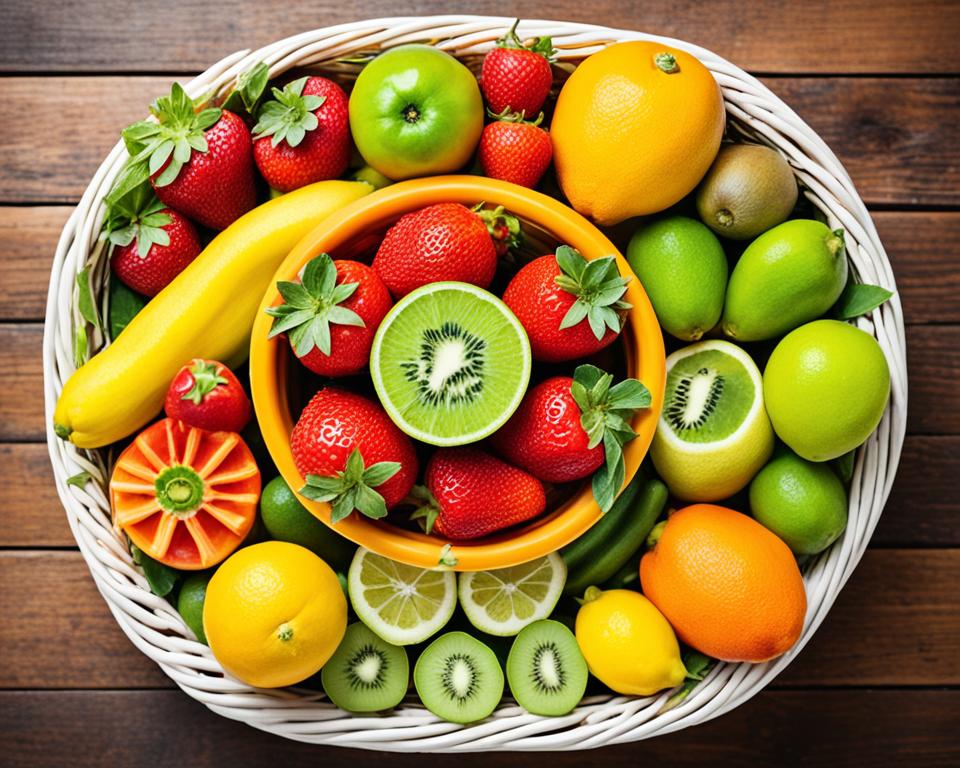
Vitamin C is an essential nutrient for overall health and well-being. Incorporating foods high in vitamin C into your diet is a great way to ensure you meet your recommended intake. Additionally, dietary supplements can provide an extra boost of this vital vitamin. Here are some natural sources of vitamin C and information on dietary supplements:
Foods High in Vitamin C
When it comes to natural sources of vitamin C, several fruits and vegetables are packed with this nutrient. Including these foods in your daily meals can help you meet your recommended intake:
- Oranges
- Kiwi
- Strawberries
- Pineapple
- Mango
- Papaya
- Guava
- Red bell peppers
- Broccoli
- Kale
- Spinach
These foods not only provide a rich source of vitamin C but also offer a variety of other beneficial nutrients.
Dietary Supplements
In addition to natural food sources, dietary supplements can be taken to ensure an adequate intake of vitamin C. These supplements are available in various forms such as tablets, capsules, and powders. It’s important to choose high-quality supplements from reputable brands to ensure their effectiveness and safety.
When considering dietary supplements, it’s advisable to consult with a healthcare professional or registered dietitian who can provide personalized recommendations based on your individual needs and health status.
Incorporating natural sources of vitamin C and, if necessary, dietary supplements into your daily routine can help support your overall health and well-being. Remember to maintain a balanced diet and consult with a healthcare professional for personalized advice.
Conclusion
In summary, incorporating vitamin C into your daily routine offers a wide range of benefits for your health and well-being. This essential nutrient plays a crucial role in supporting various bodily functions and has numerous uses that can enhance your overall quality of life.
Vitamin C is known for its immune system support, helping to strengthen your body’s defenses against common illnesses like colds and flu. Additionally, it promotes healthy skin by acting as a powerful antioxidant, reducing the signs of aging and maintaining a radiant complexion.
Furthermore, vitamin C plays a vital role in wound healing, as it aids in collagen production and tissue repair. It also contributes to heart health by reducing the risk of heart disease and providing antioxidant effects to support cardiovascular function.
Another important aspect of vitamin C is its impact on eye health, reducing the risk of age-related conditions such as cataracts. It also supports brain function, enhancing cognitive performance and reducing the risk of cognitive decline.
To ensure you receive the optimal amount of vitamin C, it’s essential to consume foods rich in this nutrient. Natural sources like citrus fruits, berries, and leafy greens are excellent options. If needed, dietary supplements can also be considered, but it’s always best to consult with a healthcare professional for personalized advice.
Incorporating vitamin C into your daily routine can have a significant positive impact on your overall health. So, make sure to prioritize this vital nutrient to reap the benefits it offers and safeguard your well-being.
FAQ
What are the uses of vitamin C?
Vitamin C has multiple uses and benefits for health. It supports the immune system, promotes skin health, aids in wound healing, contributes to heart health, maintains eye health, enhances brain function, aids in iron absorption, improves exercise performance, and supports stress management.
How does vitamin C support the immune system?
Vitamin C is known for its role in boosting the immune system. It helps in fighting off common illnesses such as colds and flu by strengthening the immune response and assisting white blood cells in their function.
What are the benefits of vitamin C for the skin?
Vitamin C is beneficial for the skin in various ways. It has antioxidant properties that protect the skin from damage caused by free radicals, reduces the signs of aging, and promotes a healthy complexion.
How does vitamin C aid in wound healing?
Vitamin C plays a crucial role in wound healing by aiding in collagen production. It helps in the formation of new tissue and promotes the repair and regeneration of damaged skin.
What is the impact of vitamin C on heart health?
Vitamin C is beneficial for heart health. It helps in reducing the risk of heart disease by acting as an antioxidant and protecting the cardiovascular system from oxidative stress.
How does vitamin C contribute to eye health?
Vitamin C is essential for maintaining proper eye health. It helps in reducing the risk of age-related eye conditions like cataracts and supports overall eye function.
What is the role of vitamin C in brain function?
Vitamin C plays a role in supporting brain health and cognitive function. It helps in reducing the risk of cognitive decline and supports optimal brain function.
How does vitamin C enhance iron absorption?
Vitamin C aids in the absorption of iron in the body. It helps in the conversion of iron in food into a form that is more easily absorbed, preventing iron-deficiency anemia.
Can vitamin C improve exercise performance?
Yes, vitamin C can have a positive impact on exercise performance. It helps in enhancing athletic performance and reducing muscle soreness post-workout.
Does vitamin C assist in stress management?
Vitamin C has a role in stress management. It helps in reducing stress levels and supports the proper function of the adrenal glands, which are responsible for regulating the body’s response to stress.
What are the sources of vitamin C?
There are several food sources that are high in vitamin C, including citrus fruits, berries, kiwi, papaya, broccoli, bell peppers, and leafy greens. Additionally, vitamin C can be obtained through dietary supplements.
Why is vitamin C important?
Vitamin C is important for overall health and well-being. It has numerous benefits and plays a vital role in supporting the immune system, promoting skin health, aiding in wound healing, maintaining heart health, preserving eye health, enhancing brain function, aiding in iron absorption, improving exercise performance, and supporting stress management.

